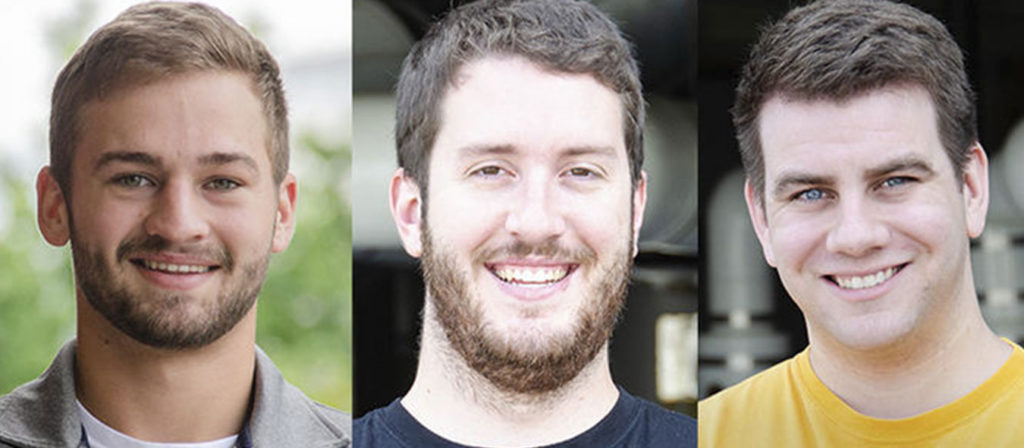While many students traveled far and wide to participate in internships, three students in the Statler College of Engineering and Mineral Resources at West Virginia University found the best opportunities right on campus.
While searching for a job that would allow him to gain real-world experience prior to graduation, Jacob Lewellen, a mechanical engineering student from Fairmont, discovered an opening for a student position at WVU Facilities Management. He decided to apply and was found to be the best candidate for the job.
The position, which began in October, has allowed Lewellen to provide critical support to WVU engineers as they conduct construction and improvement projects across campus, mostly pertaining to electrical and heating and cooling systems.
“My responsibilities include preparing electrical, piping and HVAC drawings for WVU employees or outside contractors,” said Lewellen. “I also update and make changes to AutoCAD drawings for electrical systems that feed power to the University.”
Lewellen recently assisted with a large project to overhaul the heating and cooling systems in Summit Hall in preparation for the start of the fall semester. This included manually replacing more than 200 fan coil units and reprogramming each system.
Additionally, he assisted the department in replacing two HVAC systems at one of their Suncrest locations. Lewellen met with contractors, coordinated the operation of cranes and provided the site engineers with blueprints upon request.
“By replacing old systems with new parts, we were able to improve many systems overall performance and efficiency,” said Lewellen. “I enjoyed seeing improvements being done around campus because not too many students or even employees know what happens here over the summer to make things run smoothly throughout the year.”
Chris Mitten, a petroleum and natural gas engineering major from North East, Maryland, and John Thomas, an industrial engineering major from Towson, Maryland, also landed internships last year with WVU Facilities Management as student closeout specialists. Since they were hired, the pair has worked closely with the department’s project managers and engineers to improve internal processes related to project closeout procedures.
“My daily responsibility is to come into the office and check with the project managers to see if there are any project files that need to be closed out,” said Mitten. “If there are, then we run through a process of closing them out, which includes calling vendors to finalize any open purchase orders and verifying that all timesheets and expenditure reports are accurate. It’s our job to make sure everything matches up.”
The closeout process is arguably one of the department’s most important because it identifies leftover funds from projects that were completed under budget. Excess funds can be returned to the University and redistributed to other areas of need, but not until a project has been thoroughly verified and closed.
“When a project is finished but not closed, there is often leftover money in the budget that is stuck in a state of purgatory,” said Thomas. “It’s there, but no one is allowed to use it until the amount that’s left is confirmed, which can take quite a while.”
Thomas quickly realized that one of the main tasks slowing down the process was verifying the time sheets. He noted that the department’s six project managers were each using their own system to record work hours on a multitude of sites, which was confusing and time consuming to decipher.
He saw an immediate need for improvement and decided to take the lead on creating a more efficient system.
“There was a tendency for necessary fields to be missing from the different timesheets, which slowed down the verification process,” said Thomas. “I took it upon myself to design a new digital timesheet document that included all of the information needed to verify the data in a quick and efficient way. I also locked the document from being edited, to ensure that the data inputted into the system would remain consistent for all users.”
Thomas’s new design was well received and implemented for use across the entire department.
“Without student support, our staff would spend more time on each project, limiting our University’s growth,” said Liza Rigucci, project engineer for WVU Facilities Management. “As WVU grows there is more and more demand for improvement across campus and our student interns are essential to improving the internal processes of our department. It’s a small role that makes a big difference.”
With a more efficient system in place, Thomas and Mitten were able to get caught up on a back log of projects that were waiting to be closed out. Their efforts allowed them to release more than $3.9 million back to the University during the duration of their internships.
“With our help, the department was able to return a significant amount of money to the University that can be used for additional projects,” said Mitten. “This has really made me feel like I’m contributing to the WVU community.”
No matter what task they are completing, it’s clear that the students will walk away from their positions better prepared to enter the work force.
“The highlight of this experience has been learning from the professional engineers at WVU,” said Lewellen. “Learning people skills and how to tackle tough situations are not taught in the classroom. I look forward to putting my new skills to use after graduation.”
“Through their newly developed financial aptitude, exposure to construction and practical application of learned skills from their classes, our student interns will be better prepared for more than just their chosen profession, but also in their lives,” said Rigucci.
